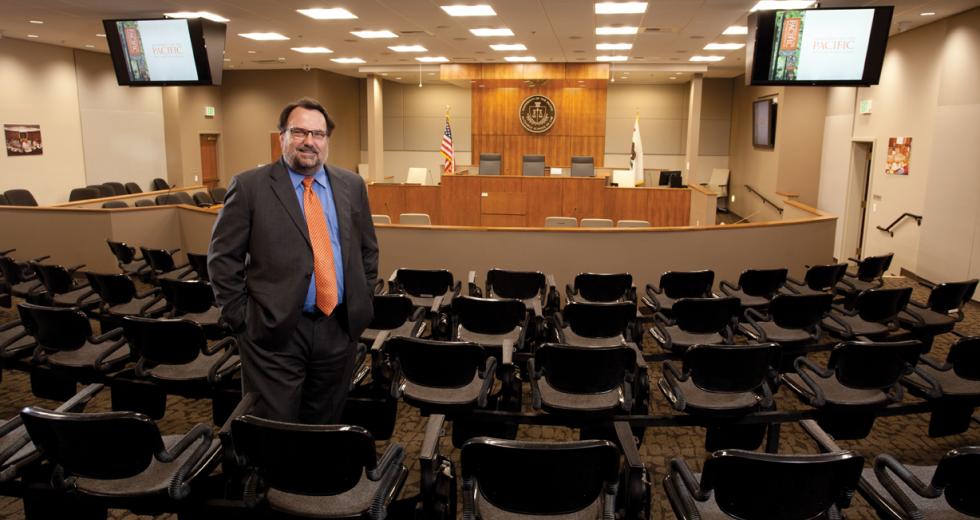Even a half-hearted glance at the headlines would suggest that these are hardly the glory days for the nation’s law schools. Tuition fees are practically indenturing students under massive debt, and the job market awaiting new graduates only has jobs for half of them. It’s little wonder law schools have seen a 30 percent drop in applications in the past year, according to national statistics.
The Sacramento region’s law schools are a perfect microcosm of the national law school paradigm, but don’t let the headlines fool you. These schools may have ground to make up, but doing so is only a matter of time. The UC Davis School of Law and the University of the Pacific McGeorge School of Law, perhaps the most recognized law schools in the region, have both endured “around 30 percent drops” in applications. Neither of their leaders, however, are ready to call the current situation a crisis.
It’s more of a challenge in two parts. First, how to keep the idea of law school attractive in the face of so much bad news, and second, how to take the gloves off and fight harder for a shrinking pool of prospective students.
“There are some dynamics of the situation you just can’t control,” says McGeorge Dean Jay Mootz, speaking of the costs associated with a legal education and the changing nature of the legal industry, which is moving away from the “big firm” model. “What we can control is how much value we provide for the cost.”
For both McGeorge and UC Davis, that has meant putting greater emphasis on clinical training that provides hands-on experience working on real cases. Both schools have tapped into their extensive alumni networks for this and are getting tremendous support in response. One notable example is Davis’s newly minted Supreme Court clinic, the first of its kind in the nation, which gets students briefing cases in the California Supreme Court and is supported by Chief Justice and UCD alum Tani G. Cantil-Sakauye.
“We’re doing what we can to enhance the skills, exposure and understanding of our students,” says Kevin Johnson, dean of the UC Davis School of Law. “The idea is to give our students an edge in getting them ready and equipped to be lawyers. Law firms are demanding that. It’s part of what we view as our charge.”
Similar curriculum enhancements at McGeorge also include emphases on communications and business skills.
“We have to remember to view law school as the continuation of a liberal arts education,” Mootz says. “It’s no secret that communication skills have degraded over time. Too many university graduates simply can’t write or express themselves, so we’re focusing on legal writing and advocacy as a core competency.”
Mootz is also working with Stockton leadership to explore offering MBA courses at the McGeorge campus in Sacramento.
“Law students need to understand that when they become lawyers they’re also entrepreneurs — they need to understand how business works, not just how the legal system works,” he says.
Importantly, while providing value for the cost is important, the “cost” element can’t be overlooked. The average cost of a J.D. program — anywhere from $40,000 to $50,000 and up per year — is a sizable deterrent. In some ways, that’s a positive in that it filters out students with lower GPAs or SAT scores, i.e., students who are likely to struggle most in the job market later on. It’s also prodding prospective students to be more deliberate about a long-term plan.
“Back when I was a student, a lot of liberal arts grads went to law school because it was cheap, and they didn’t have anything better to do,” Johnson says. “Now, the price of a legal education really necessitates being thoughtful about how they plan to use a law degree.”
Mootz agrees, saying that while he’s working hard to recruit new students, he cautions them against going into law school with the equivalent of an undeclared major. “You have to be very intentional. Don’t just go to law school because you aren’t sure what you want to do with your career,” he says. “You don’t need a plan that’s refined down to the last detail, but you should have an idea of why you want to be a lawyer, what area of law you want to practice and what you want to achieve with a law degree.”
Even the best, most focused students shudder at the notion of taking on the equivalent of a small mortgage to earn a law degree, however, especially in today’s economy. Thus, financial support has become one of the most intense areas of competition.
“We’re seeing a whole range of competitive moves to attract the best and brightest students,” Johnson says. “We have to work hard and raise money for scholarships for our students. Ultimately, I’d say anywhere from 80 to 90 percent of our students end up receiving some kind of financial assistance.”
One of UC Davis’s competitive moves is the expansion of its loan repayment assistance program. Specifically, the program is being enhanced to offer help to graduates who go into public service and public interest jobs. The objective is to preserve choices in legal careers, particularly for students willing to work for relatively low wages while making a positive contribution to society.
Where UC Davis and McGeorge part ways in long-term strategy is in the area of getting more warm bodies on campus. Even with the dismal circumstances, UC Davis still enjoys a ratio of about 10 applicants for every spot in the program — there are no pipeline concerns there. That’s not to suggest McGeorge is hurting — applications are only down, not disappearing. Even so, Mootz and his leadership team are exploring some innovative ideas, beyond offering MBA classes, to attract more students.
“We’ve got a 13-acre campus here, and as the market for J.D.s contracts, we need to better utilize that space,” Mootz says.
One new idea is to offer a new Master of Science and Law degree, something that could perhaps be called “law school light.” It’s designed for people who don’t need law degrees and don’t plan to practice law but could benefit from a legal education. It would be targeted toward human resource professionals, lobbyists and government relations professionals, public affairs practitioners and other fields that regularly intersect with the legal arena. As envisioned, the program could be completed in one year of full-time study or two years part time and at about three-quarters of the cost of a J.D.
The concept still needs to go through a formal approval process, but if all goes as planned, classes could begin as soon as this fall.
“I think this kind of program is the wave of the future in legal education,” Mootz says. “Just like in health care, where we’ve seen a differentiation of degree and certification programs, such as physicians’ assistants and so on, I think we’ll see the law industry move in that direction.”
Recommended For You

Prospective Hires
This year law grads are more likely to land jobs
Ryan M. Norman is the son of a pharmacist, raised in Vacaville with dreams of being an FBI special agent. When that path proved unlikely, he became an attorney instead.




